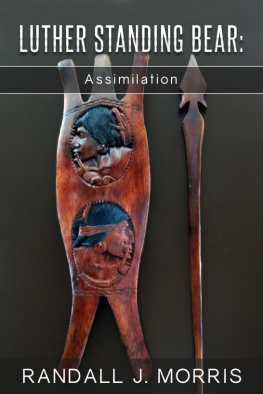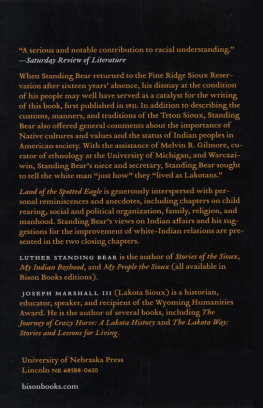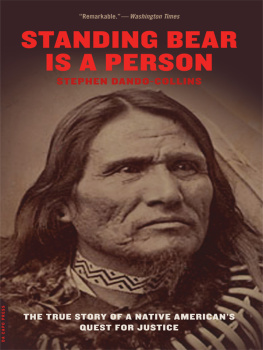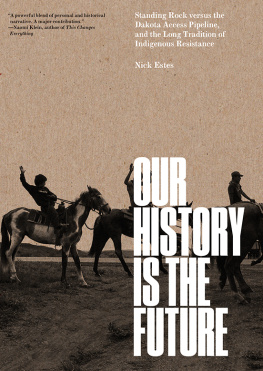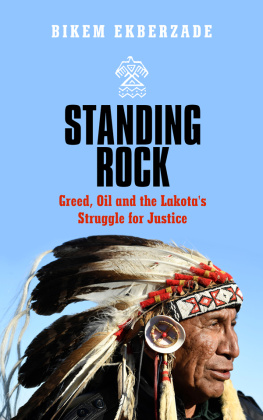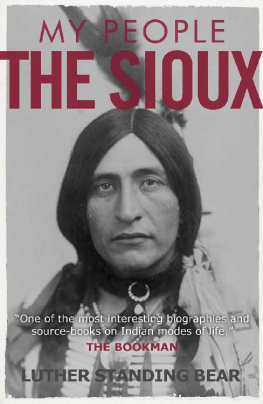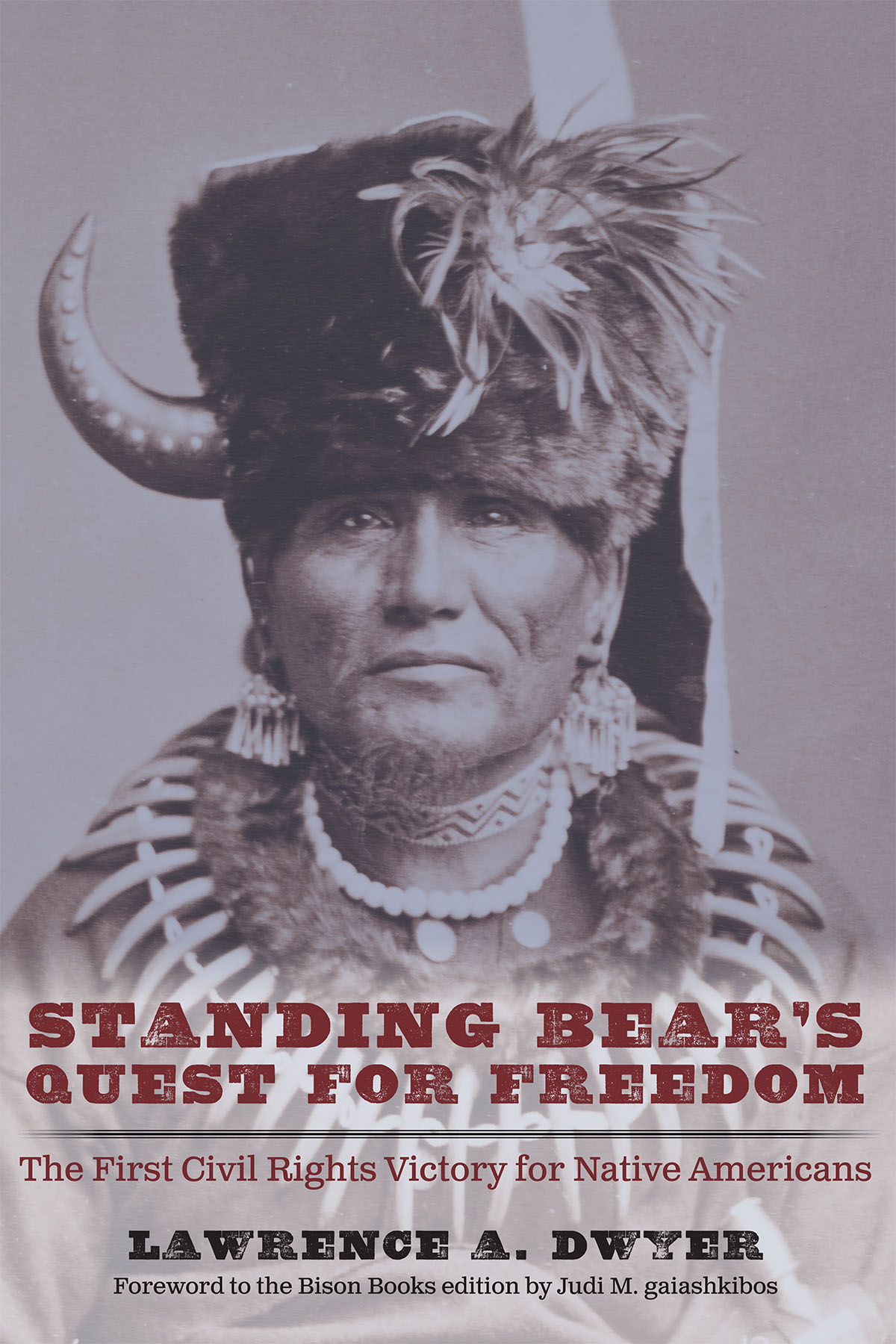
A history involving the law, government policy, treaties, and the military could so easily get mired in technical language. This book never does. Rather, it maintains a crystal clarity, nimbleness, and focus on what mattersthe people, their humanity, and what happened.... [Dwyer] has created a vivid picture of the events before, during, and after the trial and never loses sight of the storys true hero, Standing Bear.
Judi M. gaiashkibos, executive director of the Nebraska Commission on Indian Affairs

Standing Bears Quest for Freedom
The First Civil Rights Victory for Native Americans
Lawrence A. Dwyer
Foreword to the Bison Books edition by Judi M. gaiashkibos
University of Nebraska Press | Lincoln
2022 by Lawrence A. Dwyer.
Cover designed by University of Nebraska Press; cover photo (detail): Courtesy of the Amon Carter Museum of American Art, Fort Worth, Texas.
First published as Standing Bears Quest for Freedom: First Civil Rights Victory for Native Americans (Omaha NE : KLD Books) 2019 Lawrence A. Dwyer.
All rights reserved
The University of Nebraska Press is part of a land-grant institution with campuses and programs on the past, present, and future homelands of the Pawnee, Ponca, Otoe-Missouria, Omaha, Dakota, Lakota, Kaw, Cheyenne, and Arapaho Peoples, as well as those of the relocated Ho-Chunk, Sac and Fox, and Iowa Peoples.
Library of Congress Control Number: 2022019453
The poem Before We CameThey Were Here (p. vii) is 2019 by Lawrence A. Dwyer.
The publisher does not have any control over and does not assume any responsibility for author or third-party websites or their content.
Betty Davis, 19342018
In February 2009 Betty Davis called and invited me to give the keynote address at the 130th Anniversary celebration of the Trial of Standing Bear sponsored by the Douglas County Historical Society. At the time Betty was executive director of the Historical Society and I was a member of the board of directors. My research for that talk fired a passion within me to write the story of the trial of Standing Bear from a lawyers perspective. The impetus to write this book would not have occurred without Bettys invitation, along with the insights and encouragement she generously gave to me, even within a month of her death. For that reason I dedicate this book to my dear friend Betty Davis.
Before the Declaration of Independence was signed and
the Constitution enacted
they were here.
Before Lewis and Clark came
they were here.
Before our ancestors came to live here
the ancestors of Standing Bear were here.
Before we came, the Poncas
hunted deer and buffalo,
fished for carp and trout,
planted and harvested corn, beans, and squash,
built their own homes
married and lived in family units,
educated their children,
defended their land,
supported themselves,
healed their sick,
honored their elders,
buried their dead,
remembered past glories,
and dreamed dreams.
Before we came the Poncas were
living their own way of lifein a manner of their own choosing,
under their own rules for self-governance,
under their own system of law.
And then we came
bringing a new system of law.
And the two systems of law collided.
Contents
Judi M. gaiashkibos
I am deeply honored to be a small part of this excellent book. Lawrence Dwyer brings clarity and light to a story that has been at the center of my life.
As a Ponca woman, the forced removal of my relatives from their homeland in 1877 and the subsequent events leading to the trial of Chief Standing Bear in 1879 are deeply personal. For me these past events continue to remain a source of pain, pride, and inspiration. They are a call to action.
I am a descendant of the Ponca Chief Smoke Maker, Shu-de-ga-xe. My ancestor was painted by both Karl Bodmer and George Catlin, when each of these men separately spent time in the Ponca village. He signed several of the treaties between the United States and the Ponca. As a young man Standing Bear knew Smoke Maker, who was his elder. They shared similar qualities as men and as leaders.
The history presented in this book by my friend, author Lawrence Dwyer, is my history, but it is also our shared history, yours and mine. This story is not unique. Unfortunately, it is one of hundreds involving broken treaties, land grabs, and treatment of Indians as subhuman. My fellow Americans are quite unfamiliar with most of these stories because this history is not mainstream and not something that is taught in school.
Standing Bears Quest for Freedom is written from a lawyers perspective. It describes in documents and prose the moving events that led to the trial Standing Bear v. General Crook. There is much to admire and appreciate in the masterful and simple way this story is told. As a Ponca, I found many elements of the book that resonated with me, but here are a few highlights of the book that particularly struck me and I know will similarly be relatable for readers.
The author strives to tell this story in the words of the people who lived it. In this he succeeds brilliantly. A history involving the law, government policy, treaties, and the military could so easily get mired in technical language. This book never does. Rather, it maintains a crystal clarity, nimbleness, and focus on what matters, the people, their humanity and what happened before, during and after the courtroom.
Lawrence Dwyer introduces valuable context, the vanishing buffalo and the strategy behind it, an explanation of the writ of habeas corpus, which was the basic of Standing Bears plea, and the treaties between the Ponca and the United States.
The trial is presented clearly and logically, including the witness testimony of Standing Bear, the closing arguments of Andrew Jackson Poppleton questioning the legality of the governments actions, Standing Bears historic speech, and the courts decision.
Throughout the book the author takes special care to describe the cast of characters who lived this story. He describes how the court case came to be, connecting the activism of Thomas Tibbles, the deputy editor of the Omaha Herald, the conscience of General George Crook, and the actions of Chief Iron Eye of the Omaha Tribe and his daughter, Susette LaFlesche, Bright Eyes, who became Standing Bears translator in the trial.
The Omaha were cousins to the Ponca and were horrified by what was done to their relatives. The Omaha father and daughter visited the commander of the Platte Region, General Crook. He was so disturbed by what he heard from Bright Eyes and Iron Eye: He called Tibbles and things began to happen behind the scenes that would lead to the case based on the human rights of Native Americans that had never been recognized by United States law.
One of my favorite passages frames the response of Omaha citizens: But for the courage, commitment, and kindness of a small group of people, this story would have had a very different and unfavorable ending for Standing Bear and his companions. And they came together because in their heart they knew a terrible wrong had been committed.
There is a real sense that stars aligned in this moment. I particularly appreciated the detailed portraits of the distinguished legal team. The author further notes the people of Omaha who packed the courtroom for the trial, cheered the ruling, and organized the Ponca Relief Committee. Finally, in a simple line, the writer says what is most true: But there was only one leading manOne Hero! It was indeed Standing Bear himself who awakened this response. His courage, his eloquence and nobility, led to the actions and sentiments of the Omaha community.
Next page

